Daydream time, dear Pandas: one of our deepest desires is to own a quaint little house somewhere on the outskirts of town, surrounded by the woods. Preferably with a long and mysterious history, a couple of friendly ghosts in the attic, and a verdigris greenhouse (or an orangery, we’re not too picky) where we can drink tea, read books, and watch the pouring rain in peace. That’s the dream!
And though home prices are finally dropping in the United States, owning a house is still beyond reach for many young adults who are watching inflation eat into their wages and savings. Hopefully, sooner rather than later, many of us will be unlocking the door to our very first property! Though there are some major things to consider before taking out a multi-decade bank loan and dumping a ton of money into any property.
The homeowners of Reddit shared their experiences in an incredibly educational thread on r/AskReddit. They revealed all the things that they wish they would’ve known before they bought and moved into their first house.
Honestly, it’s a great primer for any prospective buyer, and it really gets you thinking about all the dozens of things you have to consider during and after your viewing. Check out their advice below, Pandas, and let us know what other pearls of wisdom you’d add. Do you have any regrets that you’d love to warn others about? What would you tell your past self if you had a time machine? Be sure to drop by the comments.
#1
That the 9 year old next door liked heavy metal. And that he was going to get a guitar for his 10th birthday. And that 14 he'd be in a band that practices in his garage. But his dad drives a snowplow and I havent touched a shovel in 5 years. "Sounds great Tyler! You guys are really coming together!"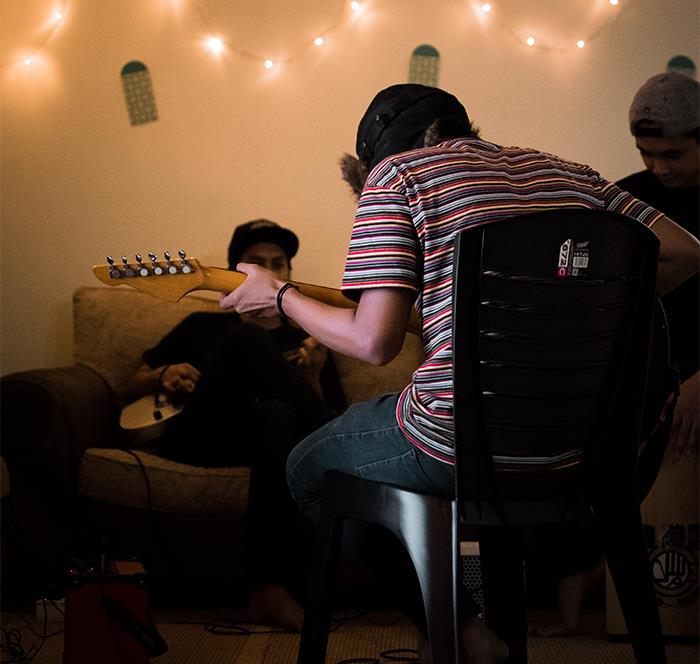
Image credits: anon
#2
The cost of furnishing a house can get out of control. Close the doors to the rooms you don't use, get stuff used and in phases. You don't need to fill every room upon move in.Vintage furniture is often of a MUCH higher quality than new.
Curtains/drapes/blinds are expensive.
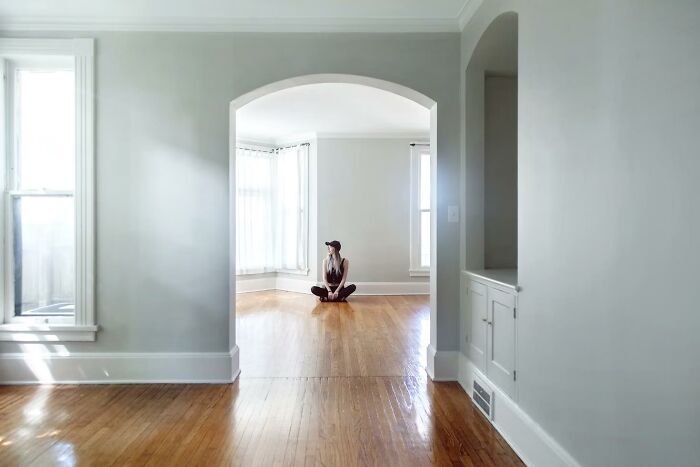
Image credits: banieldowen
#3
That I wouldn't be working for the same company 5 years later.One of the reasons we bought our first home was because it was close to work. but was a long drive to the other jobs I had later.

Image credits: anon
CNN reports that the economists at Goldman Sachs expect home prices to decline between 5% and 10% from their peak in June, 2022. Meanwhile, Wells Fargo forecasts that the national median single-family home prices will drop by 5.5% year-over-year by the end of 2023, as mortgage rates rise. Economists also anticipate that prices will rebound and rise again in 2024.
In short, if you’re looking to buy your first home, you might want to wait a bit for prices to drop, without putting the purchase off for years and years. However, nobody can be sure where exactly the bottom will be and what the future holds for the property market. Obviously, this isn’t financial advice, as we don’t have a working crystal ball (alas!).
#4
Do not engage a building inspector recommended by the agent trying to sell the house. Go with someone independent that will be honest about all the problems. Attend the property inspection and physically view everything the inspector brings up as an issue.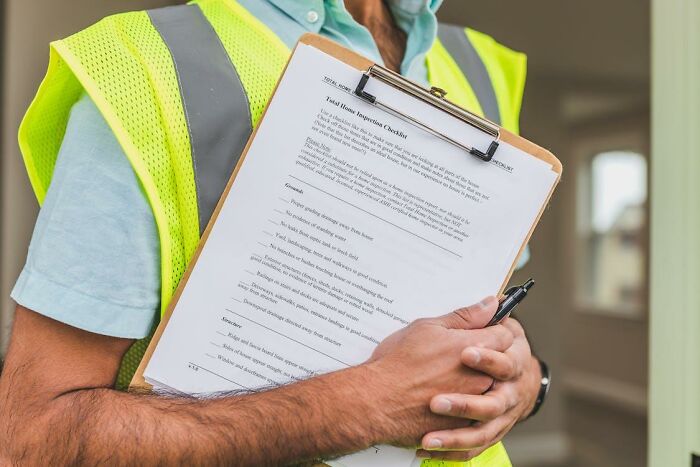
Image credits: humanbinchicken
#5
Pay attention to the grade of the yard. Where is the water going to flow or pool if it rains. Water issues are the worst.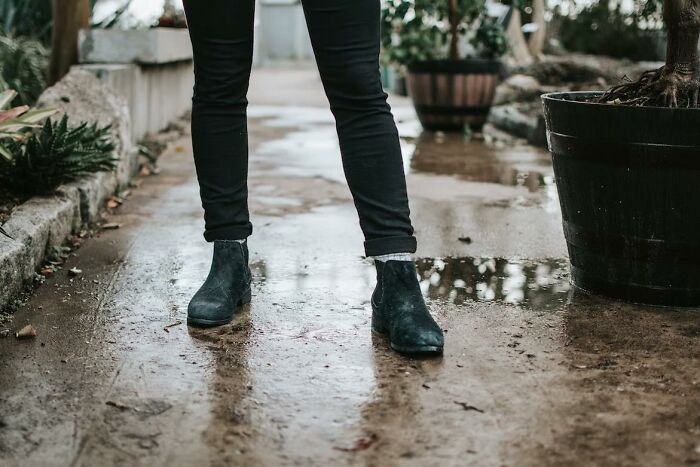
Image credits: Crusha79
#6
How much everything costs.Just general maintenance. Bills and mortgage are known and predictable, but then there's broken boilers, washing machines, fridges, paint, random tools, and all sorts of other stuff that just adds up really quickly.

Image credits: Y3VkZGxl
During an earlier in-depth interview, Bored Panda spoke about home-buying with Ariane Sherine, the editor at These Three Rooms. We had a chat about why some builders make completely non-sensical decisions and major mistakes while working on the property, as well as how to embrace the fact that no home will ever ‘perfect.’
"Certain materials might be unavailable so they decide to use an unsuitable substitute, or they might have a surplus of the substitute that they want to use up. They might be misinformed and not very good at their job and think they're doing the right thing. Or they might be trying to save money and end up cutting corners as a result," Ariane explained to Bored Panda the motivations behind some builders’ less-than-stellar results.
According to the editor at These Three Rooms, a major red flag is when you notice that corners have been cut when builders use materials that aren’t fit for the purpose. For instance, using wood like oak, ash, and pine—which aren’t weather-resistant—for outdoor construction.
#7
Thankfully we did know this. The bank will approve you for way more than you will be able to comfortably afford. For example (using made up numbers) we were approved for $250k. We knew realistically that we could not afford the monthly mortgage on a house that expensive without eating ramen for 30 years. So we bought a house at $180k and living very comfortably.As a 24 year old newlyweds, the thought of having a nice $250k house sounds nice, but you have to think realistically. What fun is it to have alllll your money go to your mortgage and you can’t enjoy a night out or pay for you car to be fixed?
That’s the advice I give to anyone looking to buy

Image credits: hotcake911
#8
There was a legit reason that my neighbor had burglar bars on his door and windows.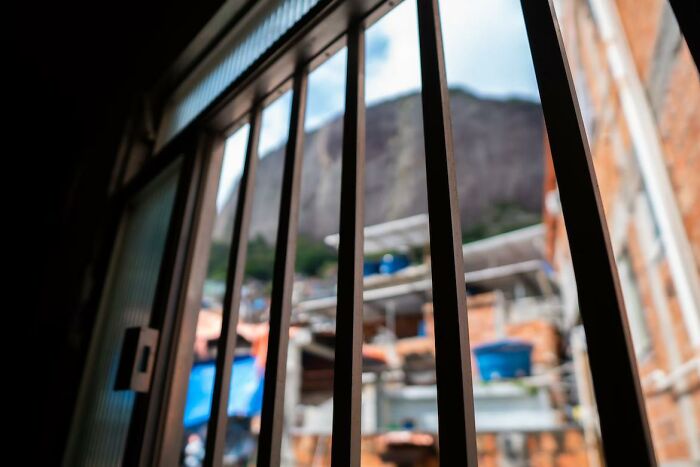
Image credits: Cpt_squishy
#9
Biggest life tip I can hand over: Flush the goddamn toilet if you're viewing a property.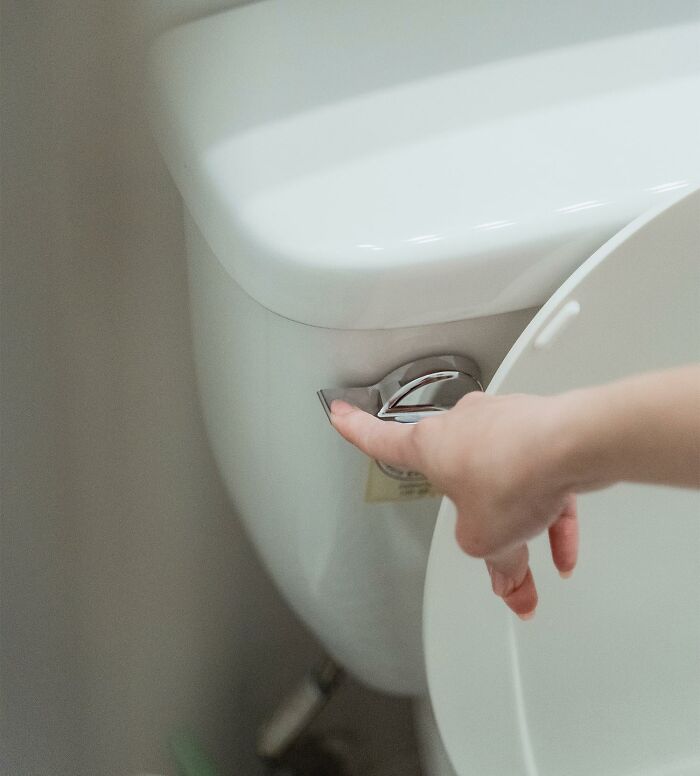
Image credits: ballsosteele
Something else that can go wrong is “not following the correct process during an installation, such as not tanking a wetroom to ensure it's waterproof. I also had a builder who fitted decking on top of my garden but didn't put down a thick heavy-duty membrane over the original garden, so to this day weeds still grow through the decking. I learned from that mistake and now advise that you should always use licensed and vetted trades for this reason," she explained why it’s so important to hire people you can fully trust to do the job well.
#10
I would say, don’t buy a home that was re-done by a “fixer upper” or DIY person. They all suck and none of them know what they’re doing.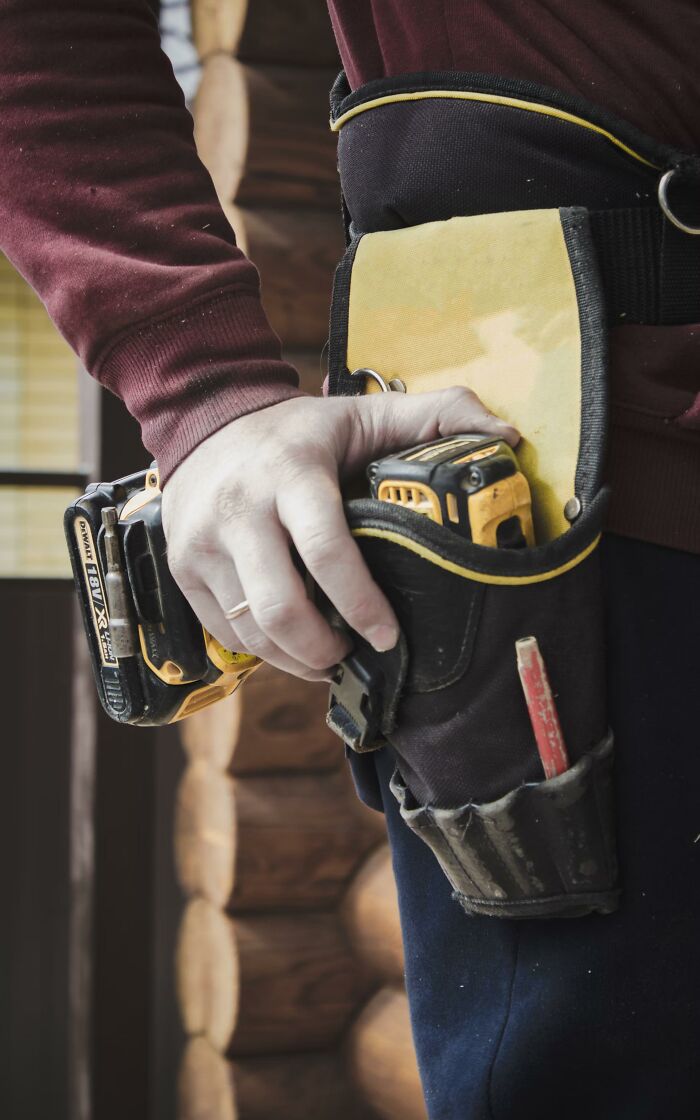
Image credits: carryab1gstick
#11
I would have spent some time hanging out in the neighborhood to see what traffic, neighbors, and noise is like. We had some issues with the family across the street for a few years. Thought they were contractors working on that house when we bought ours but turned out they lived there and they were bonkers.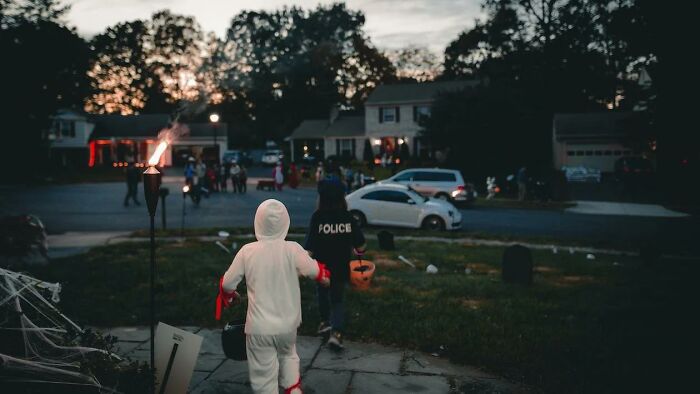
Image credits: core-void
#12
That my fiancee was having second thoughts and that buying the home together would speed up our relationships demise. . . If you're gonna buy a home with someone else, make sure you guys are in a good place emotionally. Let me tell ya, it sure sucks being forced to live with your ex until you can afford to sell your home. That was NOT a fun year.
Image credits: Orcas_are_bad
Ariane noted that no house is ever truly ‘finished’ or ‘perfect’: they will always be works in progress. What matters is that you embrace quirks while fixing real problems.
"There's always some problem, something to fix or replace that would make it better. Realistically, as long as there's nothing major such as a faulty boiler or leaking roof, it's up to the homeowner what they're willing to live with," she told us.
"I personally want to make my house as beautiful and well-functioning as possible because I'm obsessed with interiors and architecture, but other people may have zero interest in decor. Only you can decide what's right for you."
#13
Make sure the a**holes next to you don't Airbnb their houses. So f*****g annoying.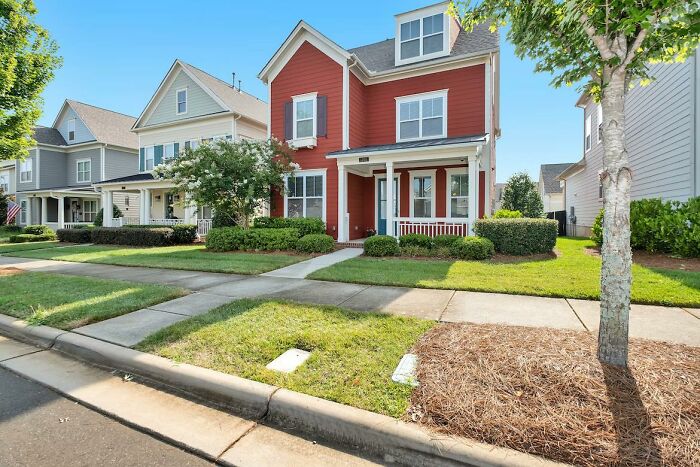
Image credits: Tidley_Wink
#14
I wish I'd known how shi**y HOAs are. Sometimes there's no avoiding them, but in our case we thought we were doing well cause the HOA was working on land grading when we originally viewed the house. Little did we know it would be an uphill battle to get necessary improvements to our house like replacing the 13 year old roof that we already had leaking problems with. We could have replaced it 3 years ago and had it paid for and not have to worry every time it rains.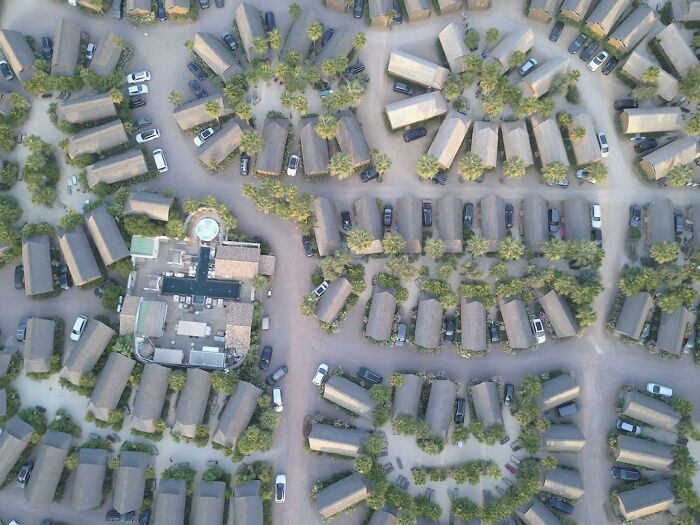
Image credits: kmgbworth
#15
Final Walkthrough.We had been in the house so many times that when it came to the final walkthrough we didn't feel it was necessary. Unfortunately the previous owners bought a chihuahua sometime between after we made our offer and when they moved out. The entire first floor is hardwood, but the finished basement is fully carpeted and that's where they kept their puppy while packing and moving. We called our realtor and he talked with theirs, but in the end there was nothing we could do. We have to recarpet the entire basement.

Image credits: Space_Case_Stace
#16
In addition to the home inspection I had done, I should have had a plumber come do a camera inspection on the sewer main to check for roots.I will have this done on any prospective houses in the future.
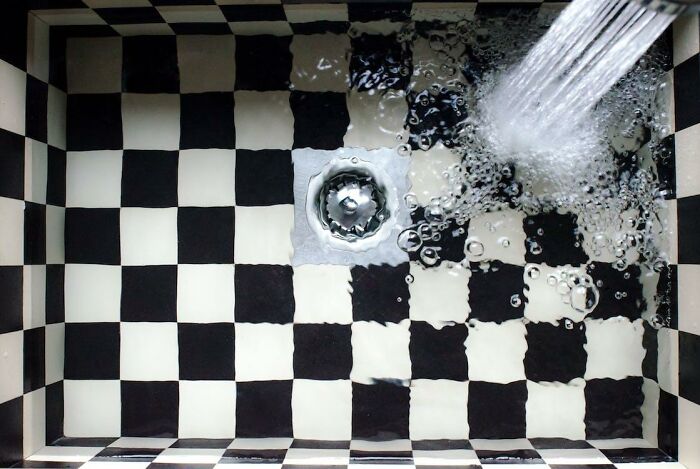
Image credits: BabaYaga2017
#17
That the down payment and mortgage is the cheap part, not the end goal. In an apartment, you generally never spend more than rent, utilities, etc. When owning a house, mortgage is the bare minimum and the sky is the limit.
Image credits: smurfytwostep
#18
The placement of the house on the property is very important.We bought a house on a corner lot. The house was not situated in the middle of the property, rather at the far back of the property. So we had the large property (which we wanted), but all of it was front yard. Virtually no backyard.
And you can't put a swimming pool, or trampoline, or swingset in the front yard.
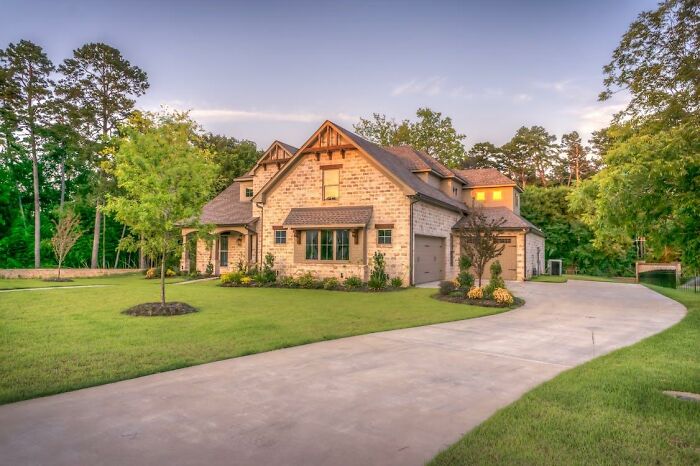
Image credits: whomp1970
#19
Don’t be afraid to back out of a sale at any point. Yes it’s kind of shi**y to the sellers and a little awkward. Loosing the $1000 or so you spent on the inspection or appraisal can sting. None of that is as bad as being upside down on a house or feeling trapped in a house.If something feels off it’s ok to walk away.
ETA: Be sure to check local laws, looks like repercussions vary from state to state :)
#20
Here's a list because just picking out one thing is silly:1. How amortization works and why banks love 30 yr term loans.
2. How PMI works and why down payments are important.
3. Have a cushion in your savings account to take care of unexpected expenses.
4. Know what the property looks like after several rainy days.
5. In a subdivision, a dead end road that leads to an empty field means it's possible you'll have 100 more neighbors living downstream from you in a few years.
6. Know how old the roof is.
7. Know how old the HVAC system is.
8. Know if there an HOA fee.
9. Hire your own independent inspector.
After you move in:
1. Know how to turn the utilities (water, electric, gas) off and on.
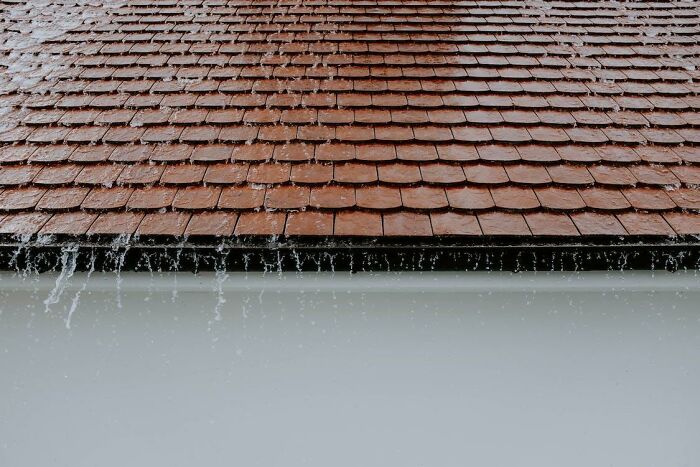
Image credits: LevelOneTroll
#21
Be very wary of staged properties. Specifically, if they look extra amazing. Move a picture off the wall (there could be a hole it's covering up), actually turn on the oven...#22
Any house built before 1990 has a good chance that it has asbestos somewhere in it. Make sure you test things before you renovate. Every f*****g time every f*****g house regardless of your local building ordinances.Source: guy who has a much higher chance of getting lung cancer.
#23
Bought my first house at 23 and my dad told me check for a good roof, water heater, and furnace since they are all expensive to replace. The house I was looking at had a furnace that was original from 84 (this was on 09) so I put in the REPC that I wouldn’t buy the home unless the seller paid for an inspection of and any necessary repairs to the furnace. Inspection came back saying the furnace just needed to be replaced all together. Seller had furnace replaced before I bought the house. Thanks dad.#24
Have at least $5000-$10,000 for home repair and upgrades, and at least set aside some money for repairs every year.#25
Never, NEVER EVER buy the best house in a bad or rundown neighborhood.....#26
After my mom bought her townhome, I ventured into the crawlspace to discover leaking hot water pipe had rusted thru both top and bottom of underlying heater duct, the resulting moisture and heat making it desirable for the termite colony that had moved into the subfloor.This was just inside the crawlspace access door in the garage, glaringly visible, but checked off on Real Estate inspection report.
Always get a second inspection prior to closing.

Image credits: anon
#27
I live in a big city, but grew up in the Greek community, nobody lives more than 10 minutes away from each other.Because a newer house in that neighborhood is upward of 800k my fiance and I couldn't afford to buy one and we didn't feel like spending 500k on half a duplex that was built in the 1960s.
We bought a house in a nice new neighborhood with a big Lake about 25 minutes away.
I wish I knew how f*****g unsupportive everyone would be, getting people, even my parents and siblings to come visit is like fighting a war. It's probably been one of the most disappointing experiences in my life. It's just 25 damn minutes. More like 22.
#28
That living in a rural area would be this isolating. I do live in a small community with neighbours, but they are all retirees, not one being under the age of 50. For a guy in his low-30s, it doesn't provide much opportunity for socializing and meeting people. This was the only place I could afford within an hour of my job, and I only commute 10 minutes to work down old country roads along the lake, but damn, what a price to pay. I will be moving within a year or 2 and going back to renting because it is way too depressing. Plus the internet is equivalent to a cup and string.#29
The Realtor isn't on your team.They get 6% of the sale cost in their pocket. They are on their team. Some of them are liars, some of them have "their guy" inspect the house.
I bought a $140k house where a toilet wasn't bolted down, doors had water POUR in under them when it rained. These were things that were "inspected" and yet in our phone call she had "never before in all her years seen a house inspected and come out so well!"
#30
Before buying a property, visit it on a weekday/weekend and also daytime/nighttime.What can seem idyllic on a Wednesday morning can be quite different on a Saturday night.
#31
That birth control would fail and we would have 2 kids in 20 months and we would outgrow our house in under 2 years.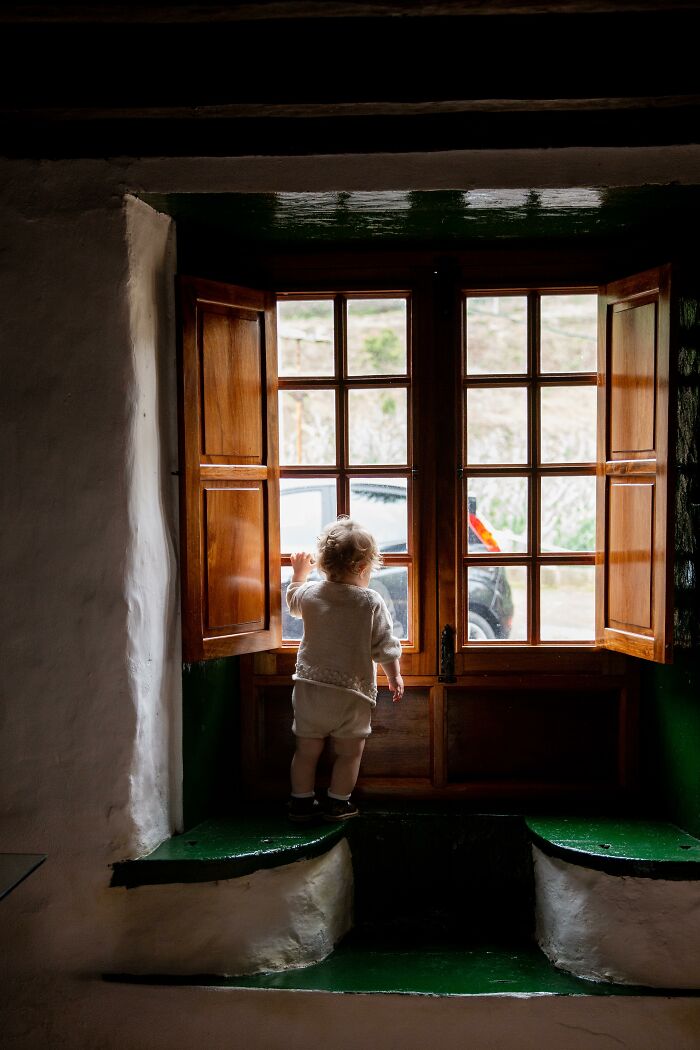
Image credits: Annihilating_Tomato
#32
Don't think I've found anything I regret that I did when buying the house so far. But there's one handy tip I can offer: drive to and from your workplace to your potential home during rush hour traffic. Both morning and evening. Don't depend on Google for that information.#33
Not a house but a condo. If you are buying in a high rise, request minutes from all previous board meetings, look for any initial discussions around large capital expenditures (window replacement, elevator repair, water risers, etc.) and check what reserves are in the building and planned increases. Don't just let the seller give you a ballpark of what things will cost.Bought a 1 bedroom condo, was told windows were being replaced in the next 2-3 years and would cost me 13k. The number actually ended up being closer to 67k.
#34
* Roof quality is NON-NEGOTIABLE. Roof MUST be fixed.* When was the last time the basement flooded?
* When was the last time the septic tank was drained?
* How is are the major appliances connected in terms of breakers?
* When was the garage door serviced last?
* Are the pipes to the water heater bronze?
* How many people does the septic tank support?
* Are appliances included?
* Check every damn outlet for electricity.
* Is there asbestos ANYWHERE in the house AT ALL, including tiles, pipes, etc.?
Just a few issues I had. 27 y/o first time homeowner. Learned a lot!
#35
Make sure to specify in your offer that the home be in move in condition and what the penalities are if it’s not.We were relocating to a new city hundreds of miles away and didn’t get to do a final walk-thru until the day before closing. The previous owners had left all kinds of junk behind that we had to deal with. (Not to mention the place was filthy). Since everything we owned was on the moving truck, which was arriving the next day we felt like we had no options but to proceed to the closing and deal with it ourselves.
I’ve since learned that if you’ve got a good realtor (get a good realtor) you can protect yourself from this situation. The contract can specify that if the house is NOT in move in condition to seller is responsible for 1) Temporary housing 2) Storage fees for your furniture, etc. and 3) The cost of removing their c**p and professionally cleaning the home.
We were young(er) and dumb(er) but our realtor should have known enough to protect us from this situation. (Did I mention find a good realtor?)
#36
When you buy a new home they do a walk-through at move-in. I wish I had recorded the walk-through and my conversation with the developer, because they went over all the appliances and stuff in the house. They also told us what to look out for and keep an eye on because there is a 6-month follow up walk-through.It was a lot of information to take in and I sure don't remember most of what we discussed. I am worried I haven't taken the best care of my appliances, or that my sprinklers are too close to the house's foundation and things that I wouldn't be worried about if I had just taken the time to take better notes or record the walk-through.
#37
"Having a pool will be great!"No, having a big pool will require at least (for me) $250 more in electricity per month during summer, hundreds more in chemicals/filters throughout the year, and a metric s**t ton of time skimming, brushing, doing chemicals, cleaning/repairing the automatic cleaner, etc...
Oh - it's fall/winter and you thought since "it's colder and the pool's shut down there won't be much to do!". **You moron**. Now you get to spend even more time hauling bigger s**t out of the pool that got blown into it during those fall/winter storms.
This doesn't include those that live in really cold areas that have to completely drain/fill their pool every goddamn year.
Never again. Buy a place with a community pool.
#38
Central ACs need to be replaced about every 15 years.#39
Use a well established, reputable company if you need improvements, repairs or maintenance. Never hire a handyman.I found that out the hard way when I got burned on a deck.
#40
A house is all about angles. Some builders like softer rounded molding and corners, others are more sharp and flat. Why is this important? Well, cleaning, painting, hanging things, repair. Dust will sit on flat molding and it never seems to clean off.When fixing drywall, sometimes these angles matter. It seems like an odd thing to consider, but just look at that house and imagine painting it or cleaning it.
Also open floor plans are just that, open. If you have kids, you hear everything. If you have roommates, you hear everything. Watching the big game? Someone washing dishes will interfere with that audio.
#41
I didn’t have much for a down payment at the time so I got an FHA loan. I wish I would have known exactly how much mortgage insurance was going to cost me. It really adds up. It was like $80 more on each payment. In hindsight I would have saved for another year and avoided watching all that money go down the drain.#42
Oh man, there are tons but here are some* Don't buy "as is" even if you have financing - get the inspection and put terms unless you're prepared to overhaul the house.
* Bring someone in after the first inspection to do an additional inspection (sure you're out roughly $500 for both but it could save you tons in the long run)
* Depending on age, check for DIY home repairs.
* RUN A DEHUMIDIFIER AT ALL TIMES. - mold mold mold.
* Ask about the dehumidifier from the previous occupants - did they use one? If not there could be mold in the walls, under the floors, everywhere tbh.
* Ask about age of shingles/roof - needs replacing every 20-25 years or so.
* Ask about age of HVAC system (heating/cooling) - need replacing every 10-20 years.
* Ask about age of water heater - 10 to 15 years
* Try to buy in spring when things are melting or view the house after heavy rainfall if you can, this will show any leaks on exposed foundation if you're buying like that
* Ask where the basement drain is if your house has one. If you get a flood you need somewhere for the water to drain.
* If it's an older house, ask about gas lines in your sewer. If you get a block and go to snake later on, you could rupture the gas line.
* Get a lot line / site survey.
* Ask about easements
* Turn on every light switch, older houses have power outlets that are associated to them.
* Turn on every tap, flush every toilet, turn on every shower, all at the same time if you can.
* Check bathroom ventilation fans.
* Again, moisture in the house will absolutely f**k you, be extremely vigilant about asking and finding any leaks from anything.
* Check the panel (fuses or breakers) as well ask about the service (100amp vs 200amp, etc) its about 2000-8000 to change out a panel.
* Check / ask about age of windows. If you live in variable climate areas your heating / cooling costs can fluctuate as much as $100+ / month just due to your windows alone.
* Ask for chattels be left such as light fixtures, washer/dryer, fridge, stove, blinds in some cases where they are screwed in. You can basically ask for anything in the house, they may counter offer but you can ask.
* I'll say it again, dehumidifier! We bought a brand new house for our second and the builder has one in every house they sell as a standard. Moisture can do all sorts of damage before you even know it's there.
Most of this is basic stuff, but it's stuff I never had anyone tell me when buying a house. Luckily, I caught my moisture problem early but goddamn they need to teach this s**t in school.
#43
Whether or not the first floor had any insulation in the walls.Spoiler: It didn't.
#44
New builds in new neighbourhoods do not equal quality homes. Half million dollar house you could put holes in by leaning on the walls wrong. Place was junk.#45
Are there any trees planted over your plumbing?if it’s a newer development and the trees are still small, take them down, find out the path of your pipes and replant them somewhere that’s not directly over your pipes. or 10 years later you will have tree roots busting up your pipes, backing sludge into your home and costing you thousands to dig up and replace. i mean, who the hell plants trees over plumbing? those b**ches can break up concrete!
#46
That moving into a subdivision means you will have solicitors on a regular basis.If you sit back and think about it, it’s obvious, but when house hunting it wasn’t something we thought about.
We put up a sign that said we had a sleeping baby and barking dogs, so please do not knock or ring the bell.
Worked incredibly well.
#47
If you don't have enough money to replace the most expensive thing in/on your house, you shouldn't buy a house. An HVAC unit can be an easy $6K+. A roof can be $10K, depending on the size of your roof. If you can't afford to replace those, you can't afford the house.#48
**FINANCING**Buy well below your means, unless you are targeting your retirment forever home (and still, even then be prudent). Get a fixed rate mortgage. Take a lesson from the 1980's and understand that we're at relative alltime lows in interest rates and we're likely to see further rises. If you take a variable rate mortage and rates go the wrong way, you are going to have a bad time - especially that it seems like we may be inside a housing bubble.
Take on as little debt as you can right now. The next 10 years could be absolutely crushing to people, as the whole economy is looking more and more like it's a house of cards ready to implode. There's a very real possibility that we see a major economic pullback in the next 10 years, that will make 2008 look like childsplay. Minimize your debt, crush it down at utmost highest priority, and get on top of that before it really hurts you.
Every one of us are "summer children" who don't know a true winter. We've kept the plates spinning for a very long time now, and we are encroaching on multiple hard-barriers that are likely to get tested soon. A good book to come up to speed on these challenges is called "The End Of Growth" by Richard Heinberg. Give that book a read, then plan and adjust. Even if it's just a "hope for the best, plan for the worst" situation.
#49
Second house. Don't buy a house that was smoked in unless you're prepared to gut it down to the studs and then some. That stink never truly goes away.#50
How awful it was to live next to an apartment complex.* The garbage thrown over the fence, including broken glass and dirty diapers.
* The people climbing over our fence.
* The teenagers shooting bb guns at our house.
* The residents abandoning their pets when they get evicted.
#51
That shared driveways suck, particularly when the house next door is being rented out and the landlord lives in another state.#52
Initial, inevitable buyers remorse. You will wake up in the middle of the night wondering what the hell you just got yourself into.On the bright side It's happened with every house I've moved into and I've missed every home I've moved from.
#53
Pay attention to the small stuff, yes, like if a doorknob is too wiggly or a toilet seat is going to need to be replaced, but really you should worry about the huge stuff. You have to become a little bit obsessed with it.Walk across any floors that aren't on the ground and see if you feel like you're walking uphill or downhill. That's a problem and it's shockingly easy to overlook if you're not paying attention.
#54
Something that hasn’t been mentioned here but is very important: wall texture. Make sure you like it because if you don’t, it’s very expensive to change. We bought a house that was walls and ceilings skip trowel and crow’s feet, neither of which we like. We got estimates to change to a flat (level 5) finish and the price was between $15k and $25k for our 2600 sq ft home, depending on the contractor. We kept the textures.#55
To have an in general knowledge of what to look for when I walk through the house. There were a lot of small issues that gradually became bigger issues that I had to fix. Between all the personal stuff going on in my life and those issues, I’m almost caught up and I’ve owned the house for 2 yrs now. Leaking valves, wiring issues, evidence that the sewer line had tree roots growing in it, random janky fixes, etc. and the previous homeowner cleaned only where you can see and didn’t clean to the same standard of me. A good example of this is he would instead of sweeping stuff into a dustpan and throwing the contents away, he would sweep it all under the fridge. I literally had to take a giant flathead screwdriver to the tile and scrape everything off because the mess stuck to the ground due to spilled fluids. Also it’s a good idea to check outlets for proper wiring. Previous homeowner twisted copper and aluminum wires together, and in one outlet the wire wasn’t long enough so he used speaker wire to extend it.#56
When I was selling my first house, the buyer wanted a small amount of mildew removed from the crawlspace. They initially wanted us to use a specific company that estimated the remediation to be about $1,500. Hired another mold remediation guy to come out and did the job for $500. The sellers mold people were not properly licensed and owned by the same parent company the inspector was owned by.No matter if buying or selling, always get a second opinion.
#57
Neighbors. A single bad neighbor can wreck one's life.#58
The guy I bought the house off built it. He was an electrician. I am also a licensed electrician. At face value the house looked well built considering it was 30 years old, but once I started doing my own renovations I realized this guys never heard of a level or square. And the electrical is by far, worse than his carpentry, pretty sure he wired it with scraps from a job site Also, I dad have multiple inspections, but in hindsight I should have done them myself, because those inspectors didn’t know anything.#59
**HOUSE**Access to internet is good. Access to water/electrical/heat. It's always good to have propane heat, even if you choose to mostly heat with wood because you have access to free wood. Backups are always nice.
Solar exposure could be huge, especially in the future with solar installs coming down in price. Having a roof of your house south facing (if you are Northern Hemisphere) with no obstructions (shade), could be very rewarding down the road.
Basement issues, leaking issues, grading. These things are all water problems that will exist. Go see the house in the SOPPING SOAKING RAIN, or just after a massive snow melt. See where water pools. Does water pool right against the foundation of the house? That's a massive expensive problem waiting to happen.
If you have kids, you want good schools, obviously.
Get previous tax information. Get previous heating bill information. Check out the age of the furnace and hot water tank. Are they owned or leased? Get up in the attic and check out insulation. Feel for breezes around windows and doors. Check window health. They are expensive to change. Are they rotting? If on a well, check water pump, water pressure, water filter. Those can be 10k to fix.
Look at municipal plans for highways, highrises, etc. How is the land around you zoned? Is that big forest behind you protected, or is it zoned commercial or industrial? What about your house? Are you zoned rural? Can you have chickens legally (if you ever wanted them).
If you live in the US, what about HOA rules? I can't believe you guys allow those things to exist, but nobody is going to tell me what I can do on land I own. If the place has an HoA and I can't grow tomatoes, then I'm not buying. F**k HoAs and their stance on your liberty. I'm Canadian, and sometimes I think I value my freedom more than your freedom lovin' muricans! HoAs are the devil, I don't know how you guys allow them to exist.
#60
When looking at houses take pictures of everything if you think this home may be the one. It helps when you are trying to make a choice between several options to go back and look.Those pics come in extra handy after you close and start wondering if the last owners swapped out some fixture or appliance before moving out.
Also go online and run a permit search to see what work has been done.
#61
Upstairs with a single AC unit in the south in summertime gets brutally hot. I'm hoping to get a dual unit installed before this summer#62
No one involved in the process is your friend. From the agents to the lender to the title company folks. No one is on your side.#63
Hi, professional handyman here. I get called when people want to sell their home and need to cover s**t up. I don't do shi**y repairs but, for example:1. I'll get requests to patch drywall cracks due to a shifting foundation. Maybe there are no immediate issues with the foundation that an inspector would catch but, if the house is starting to sink on one side, there might be recurring cracks in the walls. I do a patch, they sell the house and three months later you're wondering why your walls are cracking in strange places.
2. If the house has gutters especially, inspect the facia boards and soffits around the home. It gets missed by inspectors routinely but it's a common issue. Basically, any place where your gutters are joined will eventually leak. Super common. Over time, the leak will rot the wood the gutter is attached to (facia board). The wood will start to split and expand and then you have to pay me a few hundred dollars to come cut out the rotten wood and patch in a new piece. I've seen homes sell with multiple rotten facia areas pretty routinely.
3. Depending on what part of the country you live in, failed double pane windows can be a very costly repair. In certain weather, the fog between the glass won't be visible so you'll need to look for mineral deposits or rust on the metal spacer. If the window looks like it has water spots between the glass, that window seal has failed.
Foundation and roofing issues are probably the most insidious so be diligent to discover any water leaks, cracks, etc.
Asking around at the neighbor's homes, in addition to be a great practice in general when considering a home purchase, is also a good way to hear about issues you may have missed. A tree fell on the house a few years ago. Maybe everyone in the neighborhood has foundation issues. The previous owners were known for being horrible slobs and doing shi**y repairs on the house, etc.
Just remember, almost every home you're looking at has had some last minute repairs done to cover up SOMETHING. Be vigilant to make sure you're not going to be paying for someone else's c**ppy work.
#64
Property tax#65
I made the assumption that I was not a handywoman. Turns out I am! I LOVE doing home improvement projects, but I neglected to keep a few grand in savings to fund this hobby. I wish I would have been able to have about $4K sitting in the bank so I could dip into it when I discovered a project to do.More annoying: my parents will only give me Victoria's Secret gift card for xmas, never a Home Depot gift card (which is my answer to the inevitable question of what do you want for xmas?). I haven't set foot in VS in *years*. I sell them online to fund my home improvements. sigh.
#66
The fact that most of the plumbing had been done amateurly by the previous owner. The bathroom sink leaked into the fuse box in the cellar, and the downstairs radiator doesn't work at all because the pipes were laid the wrong way around.Frankly, if they hadn't changed their phone numbers and conveniently forgotten to leave a forwarding address to the building's HOA, I'd have a mind to take them to court for misrepresenting the property.
#67
Make sure there is an outlet in the bathroom. I didn’t.#68
**LAND**How amazing it is to have a little bit of land to play with. I'm converting my lawn/grass area into a wildlife ecosystem. Everything is food or medicine. I'm 500-800 plants in now, and it's such an incredible hobby - AND I would have never thought I'd enjoy this. I guess it's just a primal thing that is likely deep within us all. It's incredibly rewarding to just walk around your land pulling food off plants.
With that in mind, the most important things to look for in land...
1. Water. You want a creek, a pond, or even just a spring somewhere on your land. Having access to free water is incredibly powerful, and it means that the water table is high enough that growing food becomes extremely simple. You can be a green-thumb before you know it if your land has water close to the surface for your plants to go find.
2. Elevation changes. Flat land is great for farmers, but slopes, hills, contour changes are ideal for playing around with. Whether it's just hills for the kids to sled down in the winter, or slopes to create swales (automatic water catchment and fertilizing systems), elevation changes are extremely powerful things. Look at terracing, rice production in China. That's the kind of thing I'm talking about. Swales are similar in design and function and are extremely productive.
3. Wild areas around me. Whether it's just privacy, or just the peace and serenity that having a wooded lot behing your house makes you feel when you are outside. There's just SOMETHING about forests. Something about trees that connects your soul to your land. And don't get me started on the magic that seeing deer in your backyard while you drink your morning coffee.
4. You don't need as much space as you think. You don't need 10 acres to have fruit trees and a garden. You can do amazing things with even a 0.10 acre footprint. 0.25 acres is enough to grow all the food your family could ever eat, and do it in a really visually appealing, land value raising food forest style. A little nature paradise.
It's all SUPER easy to do, and will be LESS MAINTENANCE than that stupid sodgrass water sucking, nutrient sucking lawn that does NOTHING FOR YOU. A little smart design (and I can teach that), and you can have a zero maintenance area on your property that looks absolutely stunning in the spring (come look at my serviceberries and cherry trees in the spring and tell me they don't make my property look like f*****g wonderland).
I wish I knew earlier in my life how amazing this lifestyle was, and how much more I'd appreciate it with a few hours of digging work, a little bit of woodchips, and a lot of smart design to make it all maintenance free. Lawns aren't sustainable, forest ecosystems are. Nature doesn't need humans to keep a forest going, but it needs them to keep unsustainable lawns going. So replace that stupid lawn with something that feeds you, soothes your soul, and connects you to your land (and raises your property value at the same time, saves the bees, etc).
#69
Do you due diligence before you buy. I'm an architect and help people with existing properties and there are a lot of common issues that come up that people didn't know before they bought their home and now have to deal with.- Is all of the work in the house permitted? You may need to go to the city to verify. Many attic/basement conversions, decks, additions, remodels, etc. are not permitted when they should have been, and that can cause headaches down the road. The real estate agent likely won't know or disclose this to you.
- Know where all of your utilities are coming in and whether there are any existing easements or non-conforming configurations. I'm working on a house now that has a sewer line for an adjacent property running through it with no easement and the other property had no idea. This is bad for the first property because it limits where you can build (can't build over the hidden sewer line) and bad for the other property because with no easement, the first property can just say f**k you and now you have no sewer line and you'll have to pay $$$ to have it come from somewhere else.
- Get a sewer scope and check if there are any cesspools or oil tanks on site that need to be decommissioned. Sewer work is $$. If it's on septic, see if the city has plans to introduce municipal sewer at any point (a cost down the road).
- If you are planning on any big remodels, pay a visit to the local building/zoning department in your jurisdiction to be sure that you're allowed to do them (things like building footprint maximums, height restrictions, setbacks, ADU limitations, etc.), also make sure you read through any relevant CC&Rs. It also can't hurt to bring in a contractor to get an idea of cost/feasibility if the ability to remodel is an immediate need.
- Roof, HVAC, electrical panel and hot water heater are all things that often need to be upgraded when buying an older home, check what is there and what will be an expense down the road.
- Water and moisture can be signs of larger issues. If it's rained recently, check the basement/crawl and attic for any leaks or moisture, also check the yard to see if there are any ponding issues.
- Check the windows. Old windows are s**t in terms of energy efficiency and replacing them all can be a big expense.
- Overall just check out the construction situation, how it was built.
- Think about how you are actually going to live in a space. Seeing a room without furniture is totally different from trying to actually lay out your existing furniture. Think about flow, how you come home every day, what your daily routine is like, really visualize living in it. Do the rooms make sense for what you need? Spaces can do double duty but know what activities you need to accommodate and where they are going to go. If doing yoga at home every day is important to you, make sure there's a space for it. Think about those little details that will have a major impact on how you are actually able to live day to day. It's very, very difficult to find a house that is going to meet all or even most of your needs from an aesthetic/functional standpoint, but know what you're getting into before you pull the trigger.
- Turn off all the lights and open all the blinds/curtains in the day and see what the daylight is like. Electrical work can get expensive but you can change the electric lighting, changing windows is much harder, and the orientation is what is.
There's a lot, man, potentially much more than this list. Really depends on the house, the construction, what you want to do, etc. Do your research, due diligence is important. Also know the issues of your location. If it's a damp environment, mold and moisture are going to be bigger issues. If it's super hot, operable windows, cross-ventilation and A/C are more critical. If it's cold, insulation and energy-efficient windows are a bigger deal.
#70
Don't buy more house than you need. I don't use my living room after cutting cable. I don't use my basement except for laundry. I don't use the second bedroom except for storage.Specific to my house- the prior homeowner move the toilet in the bathroom to add more storage space. It's a long, thin bathroom and they put the toilet in front of the sink. They put in a super small toilet, and I assumed it was for the kids. I replaced it because it was weird sitting so low to the ground on it, and the valve that kept the water in the tank kept causing problems. At $25 for each new replacement, and $75 for a new toilet, I eventually decided t buy a new toilet. Turns out it was a small toilet was because a full sized toilet makes you have to walk sideways/sidestep to pass by. I'm probably going to have to buy/install another small toilet to sell the house.
#71
How the initial apprehension wasn't justified. Yes it's a colossal amount of work with headache after headache. You'll spend so much time staring blankly at something going "what the f**k do I do with *this*?". But through it all it's so unbelievably worth it as long as you are willing to accept what comes with it.#72
How to spot shi**y tile work and checking the P trap of all nearby sinks to make sure the dumba*s didn't try to wash the extra grout down the sink creating a concrete plug preventing any water flow.#73
My mortgage company sold my loan to a different company the week after purchase. I wish there was a way to know who would own my loan in advance.#74
Having your laundry room on a different floor than your bedrooms is the worst. Not having a true "laundry room" is the worst.#75
That my wife gets extremely attached to things, which includes the house. I like my house. But its a pain in the a*s.Every room is a little too small. Things are kinda old and don't work quite as well as you want. The property needs a good bit of work to get it up where I would want it.
It was a great home for where we were 8 years ago. However, we've both had significant growth in our professional life. That's come with more money and more work. Less time to fix things, but I can afford something newer now. It will cost a lot to fix all the stuff wrong here and in the end you just invested a ton of money into a house that's still a little too small. I'd rather save the cash, sell the house and buy something closer to what we want in the end.
#76
You need a second bathroom. Doesnt have to have a shower, but you need a second bathroom. You can sponge bath or shower at the gym if something is wrong with your shower. You cant live in a house without a functioning toilet. One bathroom means you can't easily remodel, and you are SOL if someone is sick or the toilet is broken. Get a house with a second bathroom.#77
* The true cost of oil to heat a house in the winter. When you go from a small 1000 SQ FT house, or a place that pays for heat, the cost can be hundreds a month; easy.* The trees in my yard. The first house I bought had this HUGE Oak tree hanging over my driveway. When I was asleep, my truck being in the driveway, I heard "TINK, TINK, TINK". Every day, my vehicles got pelted by hundreds of acorns. I had to spend $1400 to get the tree removed.
* Sand pit with a fire pit? COOL!!! Until I got a dog and it was the worst experience daily. He would roll in it, get sand in his paws. I would have a beach in my house every day after letting him out. Got rid of that a year later and made it concrete.
* The amount of tools I need for small tasks around the house. Allen wrenches, screwdrivers of different lengths, wrenches. Every item in the house seemed to need a different tool to work on.
* Thanks to the acorn problem, I had a mecca of chipmunks and squirrels in my yard. Digging into my vinyl of my house, always on my roof, in my cars. Getting rid of the tree helped.
#78
There is a wooded area close to my house. Roaches live in wooded areas. Luckily it's as easy as spraying your yard/house with your preferred insect repellent, but that first summer was uncomfortable.#79
In many states, your monthly "mortgage" payment may also include home insurance, taxes, and if you couldn't fork over 20% in cash, mortgage insurance. So even though you think you're going to finance a house for $1900 a month, be ready for the other costs as well.Also, buy some toiletries before you move in. There's nothing worse than being halfway through your ceremonial break-in-the-blumbing business to find you've forgotten toilet paper...
#80
If you live in an area that gets snow... A south facing driveway is really great. I feel sorry for my neighbors on the opposite side of the street. I swear the North facing driveways have snow on them most of the winter while the South facing ones look like Spring has sprung as soon as the sun hits them.#81
That my neighbor "prefers the way our front lawns looks when they're cut together so they form the same pattern."#82
I wish I would have known that living next door to family doesn't always work. No matter how good it sounds.#83
I love my home but all the single older ladies that live alone and somehow feel is ok to send us letters about our lawn is annoying as s**t.We have a company taking care of it. A few clippings here and there does not warrant a 3 page letter.
